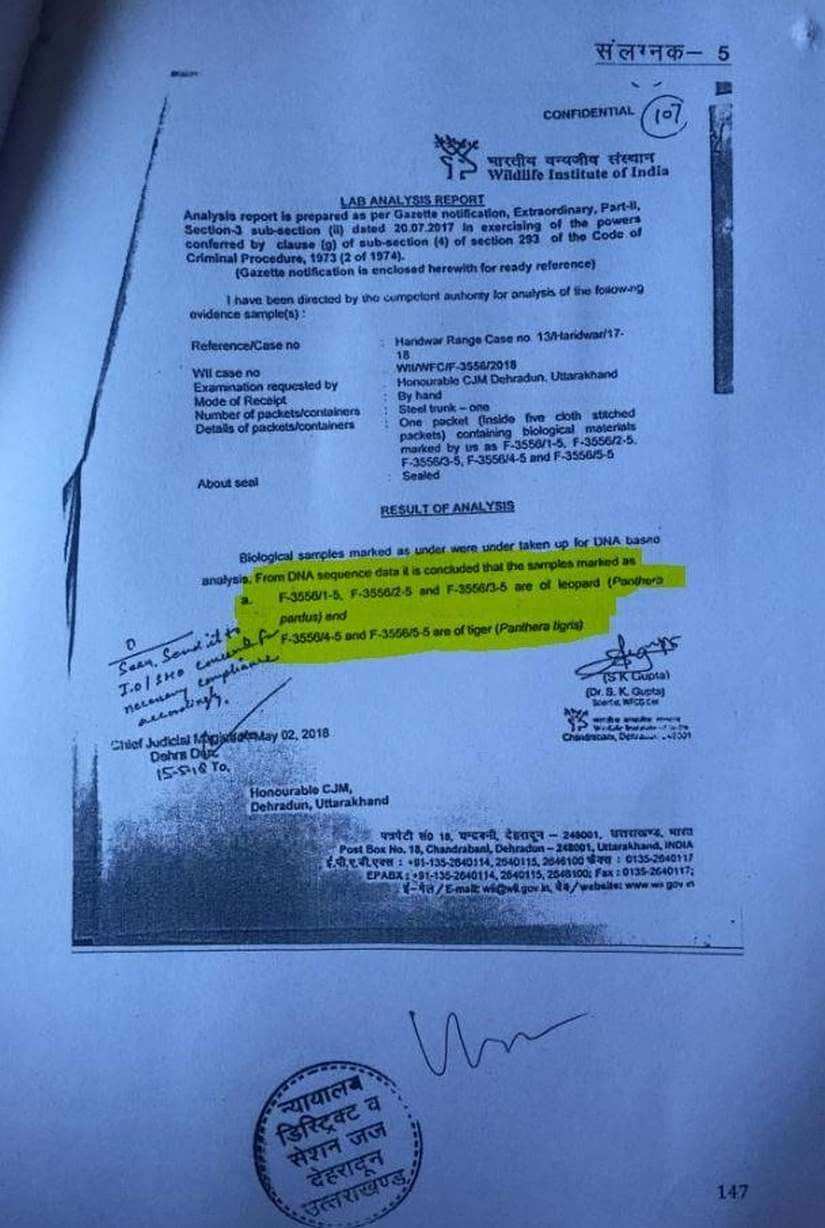An official inquiry report in a poaching case of 2018 has named 11 forest officials, including the field director of the Rajaji Tiger Reserve, Sanatan Sonkar, for purportedly fabricating information and hiding proofs of poaching. On 13 February, 2019, the chief conservator of forests (CCF) Manoj Chandran submitted the report to a judicial magistrate in Dehradun, the Uttarakhand High Court, the state government and the principal secretary (forests) for further action. When contacted by this reporter, Sonkar said, “I am not aware of any such report and so would not like to make any comments.” Here’s where it all started: On 22 March, 2018, a Dehradun forest division team seized meat, bones and leopard skin near Haripur Kalan, a village on the boundaries of the park that falls under the Dehradun district. The Wildlife Institute of India later confirmed that the bones and meat belonged to three leopards and two tigers, and not one leopard as was reported. [caption id=“attachment_6315671” align=“alignnone” width=“825”]  The report of the Wildlife Institute of India. Ankita Virmani/Firstpost[/caption] Soon after the seizure, the then principal conservator of forests (PCCF) DVS Khati appointed Manoj Chandran as an investigating officer and asked him to submit a detailed report. In his interim report of August 2018, Chandran had been able identify the connivance of five forest department officials (the field director Sonkar, wildlife warden Komal Singh, range officer Anup Gosain, deputy range officer Ashok Singh and forest guard Pravesh Kumar) and sought permission from the principal secretary (forest) to charge the officials under Section 197 of CrPC (prosecution of judges and public servants). While the investigation was going on, Chandran was removed from the case. Speaking to Firstpost, he said, “I have submitted my report of over 500 pages report to the court, and I am not supposed to share the details with the media.” A series of malicious events lies behind the alleged involvement of officials at the level of field director and warden. From 2014 onwards, leopard(s) claimed the lives of more than 16 people and injured 11 people in and around the Motichur range (from Raipur to Haripur Kalan) of the tiger reserve. The failure of the forest department in culling the man-eating leopard (or leopards) has outraged the locals. [caption id=“attachment_6315691” align=“alignleft” width=“380”]  Representational image. Reuters[/caption] The forest department removed 11 leopards from the area, without identifying the real man-eater. As a result of this, the attacks continued. The report reveals that to deal with the pressure from the locals and the government to eliminate the problem animal, the range officer of the area Vikas Rawat appointed poacher Nareshnath. The killings were happening with the consent of Rawat, with the mutual understanding that the objective was to minimise the man-animal conflict. Poachers made money by selling and trading the body parts of the leopards. The final report has named 11 people from the forest department and 14 poachers. Rawat said “The range from where the skin has been seized doesn’t fall under my area. Five investigation officers of the forest department have been changed in this case. This particular report has recommendations for filing a case against me under 20 Sections of the IPC and a Section of the SC/ST (Prevention of Atrocities) Act. I will speak about it only after taking the opinion of my lawyer.” On 1 March, 2019, wildlife activist Dinesh Pandey sent a notice to the principal chief conservator of forests (wildlife) to take necessary action on Chandran’s report within 60 days, else a case under Section 55 of the Wildlife Protection Act 1972 will be filed in the court. Speaking about the case, Pandey said, “It is extremely sad that instead of taking action against Sonkar, the forest department has now promoted him.” The present case is a serious one for two reasons. Firstly, it highlights that the Indian leopard is facing a degradation of habitat, and threats due to poachers and man-animal conflict. Secondly, it also foregrounds the involvement of forest officials in the killings of leopards. Man-animal conflict, especially man-leopard conflict, is not new to Uttarakhand. However, the number of cases has increased in recent times, and one of the main reasons for this is urbanisation. The cutting of trees and the degradation of forests has brought leopards close to human habitat. Jim Corbett, in the concluding chapter of his best-selling book ‘The man-eating leopards of Rudraprayag’ referred to the leopard as “… the best-hated and the most feared animal in all India, whose only crime – not against the laws of nature, but against the laws of man – was that he had shed human blood, with no object of terrorising man, but only in order that he might live…” These lines are still relevant in the present context. Corbett shot dead the famous man-eating leopard of Rudraprayag in 1926. In the hilly state of Uttarakhand, the leopard is still fighting the last battle for its survival. The Indian leopard is listed as “vulnerable” on the International Union for the Conservation of Nature’s Red List and is protected under Schedule I of the Wildlife Protection Act, 1972. According to the Wildlife Protection Society of India, 1,593 leopards were poached across India in the past 10 years. Is it high time India needs a “Project Leopard?”
On 22 March, 2018, a Dehradun forest division team seized meat, bones and leopard skin near Haripur Kalan, a village on the boundaries of the Rajaji Tiger Reserve.
Advertisement
End of Article


)

)
)
)
)
)
)
)
)



